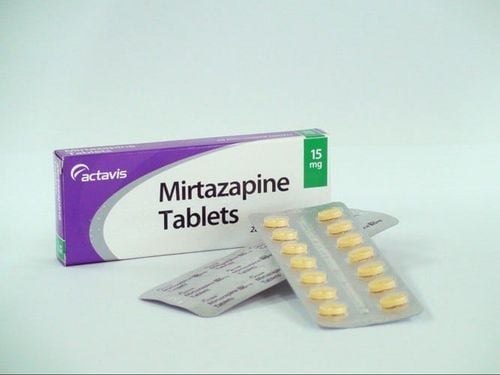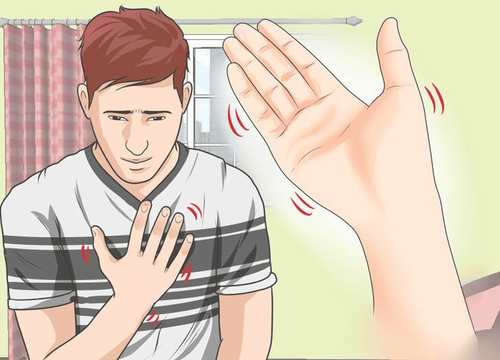This is an automatically translated article.
Currently, there are many antipsychotic drugs used to control mood and affective disorders for patients. In which, Phenothiazines, represented by Thioridazine, are very commonly used for schizophrenia patients. What are the uses of Thioridazine?
1. What are the uses of Thioridazine?
Thioridazine HCL is a medication used to stabilize mood and treat certain emotional disorders (such as schizophrenia). Medicines help patients think more clearly, reduce anxiety and return to normal daily life. Thioridazine also helps prevent suicidal thoughts in patients with thoughts of self-harm and reduces aggression and the desire to hurt others. Medicines can help people limit negative thoughts and hallucinations. Thioridazine HCL belongs to the group of drugs called phenothiazines.2. How to use Thioridazine
Thioridazine is to be taken by mouth before or after meals as directed by your doctor, usually 2 to 4 times a day. The dose of Thioridazine prescribed depends on the patient's health condition and response to therapy. When the condition improves and the patient feels better for a while, the doctor may prescribe a gradual reduction in the therapeutic dose of Thioridazine.
This problem needs to be done over a period of time, so the patient should not suddenly stop or reduce the dose of Thioridazine without the permission of the doctor. The patient's condition may worsen when Thioridazine is stopped abruptly. Patients need to maintain treatment with Thioridazine HCL regularly, regularly as indicated to receive the most benefits.

Thioridazine HCL luôn cần được uống theo chỉ định của bác sĩ
3. Side effects of Thioridazine
Common side effects of Thioridazine include dizziness, lightheadedness, drowsiness, difficulty urinating, constipation, restlessness, headache and blurred vision... if these signs persist or worsen, people Patients should promptly notify the doctor or pharmacist. Dizziness and lightheadedness are side effects that increase the risk of falls, so patients need to change position slowly to limit the danger.
Tell your doctor right away if you have any of the following serious side effects of Thioridazine:
Run; Facial expressions are like masks; jerky movements when walking; Signs of infection ; Vision changes such as loss of vision, sudden difficulty seeing at night, brown tinted vision; Severe dizziness; Faint; slow heart beat; Convulsions. Thioridazine may cause a condition called tardive dyskinesia. In some cases, this side effect of Thioridazine can be permanent. Notify physician immediately if patient develops any unusual or uncontrollable movements (especially of face, lips, tongue, arms or legs).
In rare cases, Thioridazine HCL may increase levels of the hormone prolactin. For women, an increase in prolactin can lead to signs such as abnormal lactation or difficulty conceiving. For men, this condition causes decreased libido, inhibited sperm production, or enlarged breasts. Patients taking Thioridazine who develop any of these symptoms should tell their doctor immediately.
Thioridazine can lead to a serious side effect of neuroleptic malignant syndrome (NMS), notify your doctor immediately if you have symptoms such as fever, muscle stiffness, muscle pain, tenderness or weakness, fatigue, confusion, sweating, fast/irregular heartbeat, dark urine, signs of kidney problems (such as change in the amount of urine).
Very serious allergic condition to Thioridazine medicine is very rare with serious allergic symptoms, including: generalized rash, swelling and itching of the body (especially of the face/tongue/throat), dizziness or shortness of breath.
Thioridazine HCL can cause very serious arrhythmias (even death) due to QT prolongation in the electrocardiogram. Therefore, thioridazine should only be used in patients who do not respond to or improve their symptoms after taking at least 2 antipsychotics or in patients with contraindications to the use of other antipsychotics. Thioridazine should not be used at the same time as other medicines that can also cause a slow or irregular heartbeat.
The risk of serious, potentially fatal side effects (such as heart failure, fast/irregular heartbeat, pneumonia) is increased with the use of Thioridazine in the elderly with dementia. Thioridazine HCL is not approved to treat behavioral problems associated with dementia. Patients should discuss the risks and benefits of thioridazine with their doctor, as well as other effective, safer treatments for behavioral problems associated with dementia.

Thuốc Thioridazine có thể gây ra tác dụng phụ là ngất xỉu
4. Precautions when using Thioridazine
Patients with a history of allergy to Thioridazine HCL should inform their doctor before using this product. In addition, patients who are allergic to other phenothiazines (such as chlorpromazine) or have any other allergies should also be concerned. Thioridazine may contain inactive ingredients and may cause allergic reactions or other problems.
Before using Thioridazine, please tell your doctor or pharmacist your medical history, especially:
Neurological problems (such as seizures, drug/alcohol abuse, sadness) severe sleep); Blood pressure problems; Certain blood disorders (such as a low white blood cell count); Parkinson disease ; Deficiency of the enzymes needed to remove the drug from the body. Thioridazine HCL can cause a condition that affects your heart rate (QT prolongation), causing severe fast/irregular heartbeat and other symptoms (such as severe dizziness, fainting).
The risk of QT prolongation is increased if the patient has certain medical conditions or is taking other drugs that can cause QT prolongation. Before using Thioridazine, tell your doctor or pharmacist about all medications you are taking and any of the following medical conditions: have heart disease (heart failure, bradycardia, QT prolongation) ECG ), family history of certain cardiovascular disease (QT prolongation on ECG, sudden cardiac death).
Low blood levels of potassium or magnesium may increase the risk of QT prolongation, especially if the patient is taking certain medications concurrently with thioridazine drugs such as diuretics or is in a state of dehydration (sweating). much, diarrhea or vomiting).
Thioridazine can make the patient dizzy or drowsy, so do not drive, use machines or do anything that requires alertness until the patient can do it safely. whole.
Thioridazine can make patients more sensitive to the sun, patients need to limit their time in direct sunlight, use sunscreen and wear protective pants when going out. Older adults may be more sensitive to the side effects of Thioridazine, especially dizziness, lightheadedness, drowsiness, confusion, constipation, difficulty urinating and QT prolongation... this can make increased risk of falls in the elderly.
During pregnancy, Thioridazine should be used only when clearly needed. Babies born to mothers who have used thioridazine during the last 3 months of pregnancy may (rarely) develop symptoms including: muscle stiffness, tremors, drowsiness, shortness of breath, constant fussiness. If any of these symptoms are noticed in a newborn whose mother is taking thioridazine, especially during the first month after birth, tell the doctor right away.
Because untreated mental problems (such as schizophrenia, depression) can be a serious condition, do not stop taking Thioridazine without your doctor's advice. If you are planning to become pregnant, are pregnant, or suspect you may be pregnant, discuss the benefits and risks of using thioridazine during pregnancy with your doctor. It has not been reported whether Thioridazine passes into breast milk, consult your doctor before breast-feeding.

Bệnh nhân mắc bệnh Parkinson nên lưu ý khi dùng thuốc Thioridazine
5. Thioridazine drug interactions
Drug interactions can change the way Thioridazine works or increase your risk of serious side effects. Some products that may interact with Thioridazine include: cabergoline, lithium, medicine for chronic hepatitis C (asunaprevir, ombitasvir, paritaprevir, ritonavir), Parkinson's disease medicine (such as levodopa).
Many drugs (including thioridazine) can affect heart rate, prolong QT such as: amiodarone, cisapride, dofetilide, pimozide, procainamide, quinidine, sotalol, macrolide antibiotics, ziprasidone... so Before using Thioridazine, report all medications the patient is taking.
Drugs that can affect the elimination of Thioridazine from the patient's body, affecting the effectiveness of Thioridazine drugs such as bupropion, duloxetine, mirabegron, pindolol, propranolol, rolapitant, terbinafine, anti-inflammatory drugs SSRI depression....
Tell the doctor or pharmacist if the patient is taking other drowsy products at the same time as Thioridazine such as:
Opioid pain relievers; cough suppressants; Alcohol; sleeping pills (such as alprazolam, lorazepam, zolpidem); muscle relaxants (such as carisoprodol, cyclobenzaprine); Antihistamines (such as cetirizine, diphenhydramine). Tests: eye exam, blood potassium level measurement, electrocardiogram.. can be done regularly to monitor disease progression or check for side effects of Thioridazine.
If you miss a dose of Thioridazine, take it as soon as you remember, however if it is almost time for your next dose, skip the missed dose, do not double the dose. Store Thioridazine at room temperature, away from light and moisture. Do not store Thioridazine in the bathroom.
Thioridazine HCL is a medication used to stabilize mood and treat some emotional disorders (such as schizophrenia). To ensure the effectiveness of treatment, patients need to take the drug according to the instructions of the doctor or pharmacist.
Vinmec International General Hospital is a high quality medical care address with a team of doctors and pharmacists with many years of experience and good expertise. When having health problems, customers can contact the hospital to be examined and have the best indications for taking medicine.
Please dial HOTLINE for more information or register for an appointment HERE. Download MyVinmec app to make appointments faster and to manage your bookings easily.
Reference source: webmd.com













